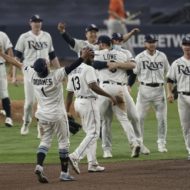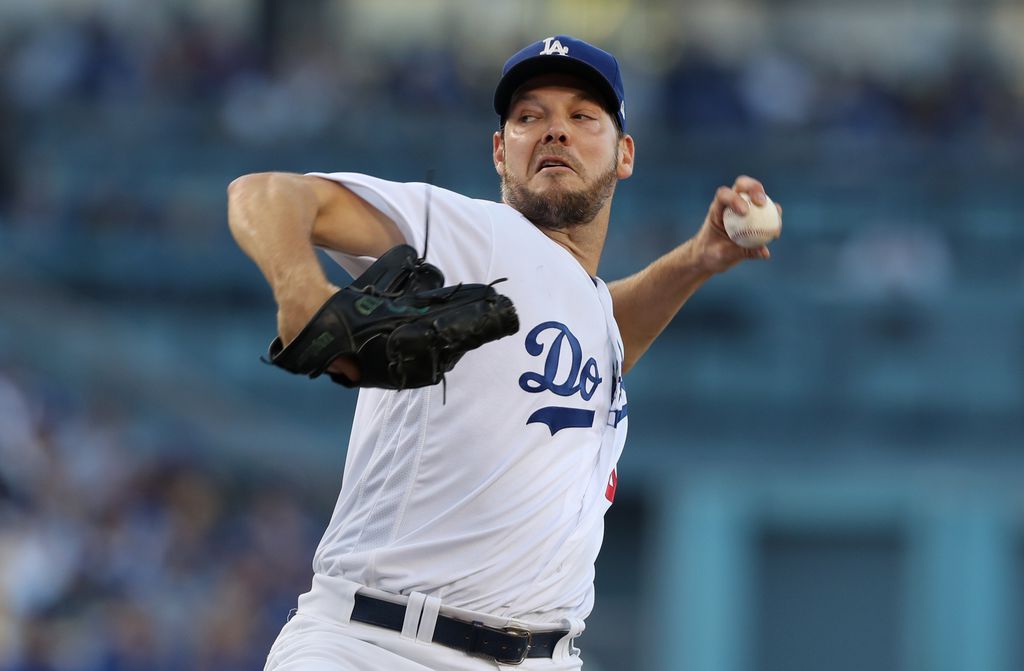
The Tampa Bay Rays reportedly bolstered the pitching staff on Friday, adding not one but two quality arms in veterans Rich Hill and Collin McHugh. Both hurlers have agreed to one-year contracts worth a combined $4.3-million. The agreements are pending physicals that may not be completed until Spring Training begins next week.
Tampa Bay is set to add two experienced hurlers who seem like perfect fits for what could be another creatively pieced together season.
Hill will turn 41 in March and has logged a 2.93 ERA/3.57 SIERA with a 28.6% strikeout rate and a better-than-average 7.9% walk rate across 503 innings as a member of the Red Sox, Athletics, Dodgers, and Twins — this despite possessing 90 mph fastball. Last season, the southpaw went 2-2 with a 3.03 ERA in 38-2/3 innings (eight starts) for the Twins, although he averaged fewer than five innings in his time with Minneapolis. A question regarding Hill’s durability lingers as knee, forearm, and shoulder issues have impacted the hurler the last few seasons. Even so, his fastball/curveball combination has made him dominant when he’s taken the mound.
McHugh — a one-time Astro, Rockie, and Met — was largely successful in Houston as a starter and reliever from 2014-19, although elbow issues have impacted him the last few seasons, including the truncated 2020 campaign — McHugh signed with Boston before last season but was not healthy enough to pitch for the club.
McHugh owns a career 58-43 record with a 3.95 ERA and 771 punchouts across 800-2/3 frames (210 appearances). He averaged 181 innings per season as a starter from 2014-16, then 70 per season from 2017-19 when he moved to the bullpen. In 2018, McHugh was exceptional in a full-time relief role, posting a 1.99 ERA and 0.91 WHIP with 94 strikeouts over 72-1/3 innings (58 outings).
The right-hander’s repertoire has evolved over time. In 2018, the average spin rate on his slider (2,835 rpm) was comparable to that of former Ray Chaz Roe (2,843), while the average spin rate on his curveball (2,799 rpm) was nearly identical to that of current ace Tyler Glasnow (2,802).
McHugh, a one-time fastball/curveball hurler, threw his slider 43.4% of the time in 2019 — dominating batters on the offering along the way. Meanwhile, his 90.8 mph four-seam fastball limited batters to a .175 BA with a .343 SLG and a 39.6% SwStr% against his slider.
The Rays sought starting pitching this offseason after parting ways with Charlie Morton and Blake Snell. As Adam Berry (MLB.com) wrote, “as teams try to safely manage the increase in pitchers’ workloads from a 60-game schedule to a 162-game season, it seems Tampa Bay is prepared to attack the challenge by loading up on ‘bulk-inning’ options.”
As of now, the Opening Day-ready starting/bulk-inning choices include Tyler Glasnow, Ryan Yarbrough, Chris Archer, Michael Wacha, Rich Hill, Collin McHugh, Trevor Richards, Josh Fleming, Shane McClanahan, Luis Patiño, Brendan McKay, Brent Honeywell Jr. and Joe Ryan will give the Kevin Cash and Kyle Snyder the necessary innings needed to navigate through the season without overtaxing any of their arms.
The Rays could piggyback starters, or throw once or more through the order — Perhaps Trevor Richards, Collin McHugh, and/or Josh Fleming, along with several others during any given contest. They could also lean on pitchers with “different looks,” conceivably pairing power right-handers — like Glasnow or Patiño — with lefthanders that focus on a fastball/slider combo, or lefties who coax grounders with righties who rely heavily on curveballs.
As Neil Solondz (Rays Radio) writes, the Rays like all teams, will have to be very flexible this season.
Why would Tampa Bay consider going this route of having so many options? For one it’s hard to fathom pitchers going 200 innings or even 180 after throwing 60 the previous year.
Perhaps for 2021, teams are more likely to get 100 to 150 innings out of starters/bulk pitchers to keep them healthy. Let’s say you get an average of 120 innings out of nine pitchers. I listed 15 pitchers above, which creates a lot of cushion for performance and health.
You can have six-man rotations at times, or tandem starters, where one pitcher goes four or five innings, and another goes three or once through the order.
Use nine pitchers at an average of 120 innings, that would cover 1080 innings, leaving fewer than 400 innings for the true relievers to cover, like Nick Anderson, Diego Castillo, Pete Fairbanks, plus John Curtiss, Cody Reed, Ryan Sherriff and Ryan Thompson among others. This way you could avoid relievers going beyond 60 or 65 innings (after going just 20 or so last year) and keep them sharp and healthy too.
— Neil Solondz
While the baseball world has hammered the Rays front office for their confounding offseason moves, Erik Neander and Co. have quietly put together a squad of impactful arms that are projected to drive the team toward another postseason run. Haters, like Fuzzy — or whatever the fuck his name is — are going to hate, however, the Rays are known to make many a blogger eat their own words. And by the looks of it, a nice dish of crow could be on the menu come October.
Noteworthiness
— The Rays submitted their Spring Training roster of 73 players on Friday — a list that did not include the abovementioned Hill and McHugh, who are expected to be added to the roster just prior to the start of camp.

